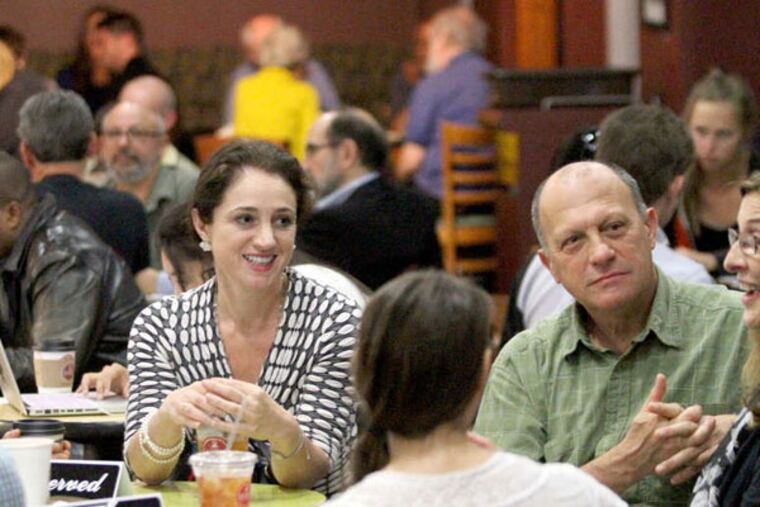Death cafes foster intimate talk of a taboo subject
Let's talk about death. That doesn't appeal to you? You're probably in the majority, but there's a subset of people who long to share their thoughts about mortality, funerals, the afterlife, even their grief for their departed shih tzu, and have trouble finding anyone who doesn't try to change the subject.

Let's talk about death.
That doesn't appeal to you? You're probably in the majority, but there's a subset of people who long to share their thoughts about mortality, funerals, the afterlife, even their grief for their departed shih tzu, and have trouble finding anyone who doesn't try to change the subject.
Those are the people Rachel Zeldin, Simcha Raphael, and Bernadette Laster hope to reach with their new death cafes, salon-like gatherings where strangers can talk freely about all aspects of death while drinking coffee or tea and munching on pastries.
Death cafes are based on the ideas of Bernard Crettaz, a Swiss sociologist. They had made it to England by 2011 and were soon on their way to the United States, according to deathcafe.com, the mother organization of the "social franchise." It says 200 death cafes have been held in nine countries. There already have been death cafes in New York, Los Angeles, Baltimore, Washington, Ann Arbor, Mich., and even Westerville, Ohio, so Philadelphia has been a little slow to get on this bleak bandwagon.
After a rash of deaths among her loved ones, Laster took the idea to a church library in Elkins Park over the summer.
Zeldin and Raphael, who both have death-related jobs, hosted the first death cafe in Philadelphia on Monday at Saxbys Coffee in University City.
Their event drew a diverse crowd of more than 30 who talked intensely in small groups for more than an hour. There was a Holocaust survivor, a teacher, a hospice nurse and hospice chaplain, widows and widowers, curious young people, an artist whose work explores what matters when time is short, a man who makes handcrafted coffins.
They skipped the small talk and plunged straight into deep conversational water.
Some snippets: "I feel anger at her not being here."
"It was a huge effort to save my life."
"It's comforting to think you're here for a reason. Personally, I don't."
"You're not a person. You're a corpse."
"There shouldn't be a you-ought-to-get-over-it thing. There are so many other cultures where you get to rip your clothes or you get to scream. Why don't we have a padded room where you can just scream?"
Laster, 49, called the death cafes a "wonderful movement. Death is going to touch everybody's life at some point."
She has spent much of her life working with people with disabilities or mental illnesses. Since 2008, she's been what she calls a medical intuitive healer. Some people call her a psychic. She says she can "connect with people who have crossed over."
Death cafes are meant to be free-form and respectful. They're not support groups and they're not intended to change people's minds. Hosts want the people who come to set the agenda, "to talk about what they want to talk about" in a comfortable setting, said Zeldin, whose company, I'm Sorry to Hear, rates and reviews funeral homes.
Raphael is a rabbinic pastor with Jewish Renewal, an emerging denomination. He's also a therapist and death awareness counselor. He founded the DA'AT Institute for death awareness, advocacy, and training.
He thinks this is a great time to talk about death. Baby boomers are aging and many are losing their parents. Hospice participation is increasing. People are interested in near-death experiences and Eastern religions.
"I think we're living through this profound revolution in terms of our cultural attitudes toward death," he said.
He believes death is still more of a "great intimacy" than sex, and a topic that feels taboo to too many. That means many don't get the support they need when someone they love dies. On the first day, friends will greet them with a serious, long face, he said. On day two, they'll ask, "How you doing?" By the third day, friends have moved on and people are left to "live with their grief in this kind of invisible way."
Jeanne Shipe, a 56-year-old widow from Emmaus, Pa., came Monday because she is organizing conversations about end-of-life wishes at her church. She too thinks baby boomers are changing our cultural approach to death, just as they did to childbirth decades ago. "I think they're taking dying back the way they took back birthing," she said.
Drew Temko, a 28-year-old hospice nurse from Newark, Del., found talking therapeutic. His job requires listening, and his friends consider death a downer. "It is a party-killer," he said.
Anthony Robinson, 60, who recently spent three weeks in intensive care, said he came looking for meaningful conversations. "I'm not all that into death," he said. "You can't really talk about death without talking about life, and I am interested in life."
Laster plans to host another death cafe. News about her plans can be found on Facebook at Philadelphia Death Cafe. Zeldin and Raphael, who call their group Death Cafe Philadelphia and Greater Philadelphia, schedule through Meetup.com. They're planning another death cafe on Oct. 24 at a site to be determined.
215-854-4944
@StaceyABurling
www.inquirer.com/health_science